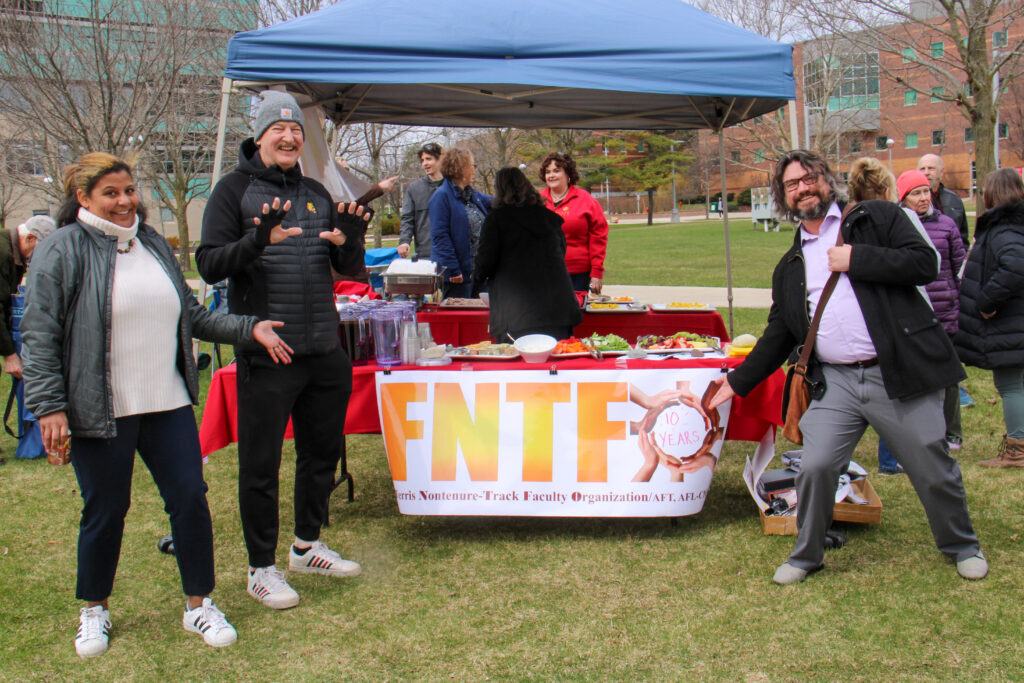Following the Ferris Faculty Association’s largely amicable contract cycle, another on-campus union is preparing for the negotiation table.
The Ferris Non-Tenure Faculty Organization voted to extend their current contract, pushing negotiations back one year to the spring of 2025.
FNTFO members now dedicate their time to strengthening relationships with university administrators such as President Bill Pink, Provost Bobby Fleischman and Associate Provost Steve Reifert.

“Our strategic plan, basically, is to be seen, and to have people know that we’re on campus,” FNTFO president Diane Jackson said. “We’re doing the same work as tenured professors, but we are not recognized as such.”
Jackson has seen a national “reluctance” to recognize non-tenured faculty members. Many in the FNTFO have worked full-time on nine-month contracts for over a decade. This impacts more than the faculty members’ pay and sense of job security.
“We’re moving to more meetings now to talk about what fairness means to us and how we belong, or possibly do not,” Jackson said. “What can we make better for students? Because the students are what we’re here for. How are we recognized by the students? How do we contribute to being a bulldog?”
When students select their classes for an upcoming semester, they are often unable to see non-tenured professors’ names attached to classes in the registration portal. This makes it much more difficult for a student to choose to take a class with a specific instructor.
Other difficulties that non-tenured faculty face vary by college and department. This has encouraged the FNTFO to regularly meet with deans from across campus.
“Every time we met with the deans, it was lovely just getting to know a little bit about the history and how the departments came about, what types of needs their faculty have,” Jackson said. “If there any faculty that are not tenured or tenure track, we talk to them about their experiences so that we can have an understanding.”
Denise Cosper is an English professor and the FNTFO’s vice president. In her department, Cosper’s lack of tenure keeps her from sitting on hiring committees or voting on departmental policies.
Cosper called the union’s current relationship with the administration “mostly non-contentious.” FNTFO’s leadership meets with Associate Provost Reifert and Michael Garrity, Ferris’ director of labor relations, on a monthly basis.
“And while there have been some moments of contentiousness over the last year and a half, I mean, that’s to be expected. When you’re thinking about negotiation type things… we are working on keeping that relationship where we can communicate with each other, and not have it be rude or ugly,” Cosper said.
Reifert stands in place of Provost Fleischman in nearly all labor relations meetings with Ferris’ unions. He appreciates the unit’s willingness to work together.
“[The FNTFO] are very agreeable [and] accommodating of big changes we made last year, and it’s because of the collaborative nature. So, it’s a very positive relationship,” Reifert said.
Provost Fleischman has met with the FNTFO this academic year. In his opinion, there is currently no disparity between the treatment of a tenured professor and a non-tenured professor.
“Not from my perspective,” Fleischman said. “Treat people the same. That is as well as we can possibly treat people, regardless of whether they’re tenured, tenure track or non-tenure track faculty. All faculty are integral to the mission of the university and serving our students.”
Fleischman called his relationship with the FNTFO “very cordial” and has stated he will continue to meet with the unit “as the opportunities present themselves.”
